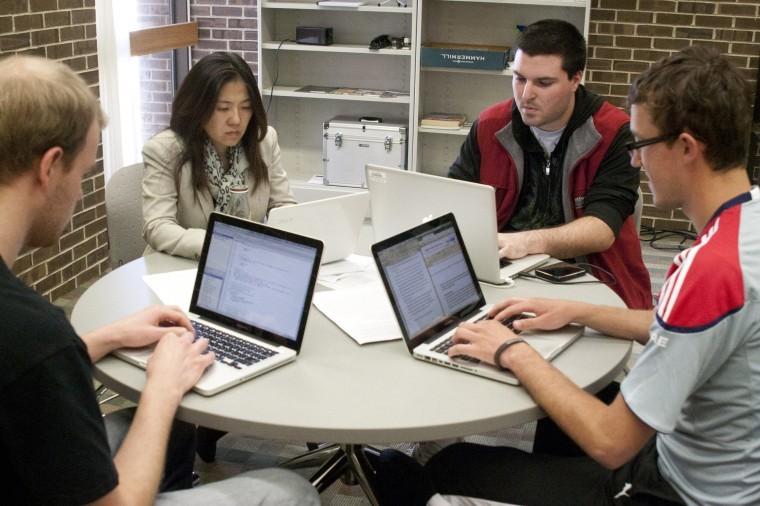Experiential Learning Lab develops ‘Literacy in Motion’ video game
Greg Remiasz, senior computer science major, doctoral student Raye Chiang, Philip Pellicore, sophomore time arts major and Eric Russell, assistant coach of the team work on a literacy game for children in the Digital Convergence Lab Wednesday afternoon.
April 4, 2012
At NIU’s Experiential Learning Lab, students and teachers alike are putting their heads together to develop new ways for children to learn.
The Experiential Learning Lab is a branch of NIU’s Digital Convergence Lab (DCL). The DCL was started in 2009 through NIU Libraries and the Outreach program.
“Its focus on the development of sophisticated multimedia materials simultaneously allows student participants to benefit from perspectives provided by peers and instructors drawn from a variety of disciplines,” said Aline Click, digital convergence lab co-director. “They can enhance their technical skills and gain hands-on experience while applying new technologies to a variety of challenges similar to those found in a modern workplace.”
This semester, the lab is working on a project they call “Literacy in Motion”. The game is designed to help kids with their literacy skills while still being enjoyable as a game.
“It is still in progress, but currently it focuses on ‘tier 2’ vocabulary words,” Click said.
Click said tier 2 refers to words that are important for comprehending language and those with multiple meanings.
“The game works to engage students in a video game in a natural contextual way that produces meaning that is self-evident and related to learners’ experiences and environments,” Click said.
Click said the lab is known for utilizing new and emerging technologies but would like to emphasize its focus on converging disciplines, as well. “It’s all about team building,” said Raye Chiang, first-year graduate student in the instructional technologies major. “This semester was all about brainstorming and designing. Next semester will be about development and the work will be more technical.”
“The skills needed depend on the project,” Click said. “Last year we did a Kinect game to teach physics, so we recruited one student for the team from the physics department. This semester and in the fall the focus in on literacy, so we need at least one student from that discipline.”
Hayley Mayall, associate professor of instructional technologies and team coach, said the experience in the lab was different than teaching her graduate students.
“The game provided an opportunity for students who wouldn’t normally work together to collaborate with different perspectives and work on a real project that will prepare them for their futures,” Mayall said.
The game is scheduled to be released toward the end of the Fall 2012 semester.







